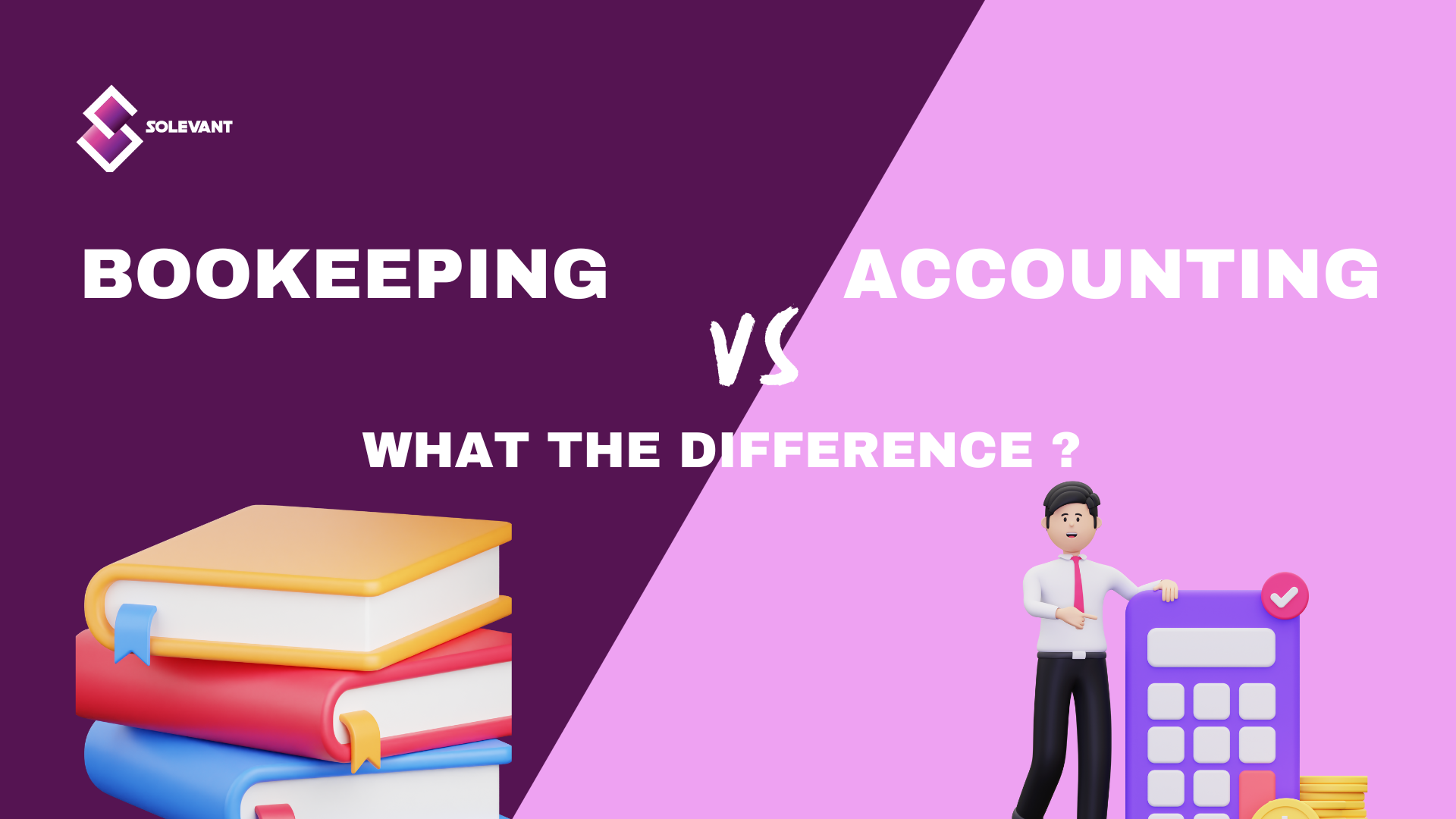In finance and business, people often mix up “bookkeeping” and “accounting,” but they’re not the same. They each have their own jobs and duties. Knowing the difference is important for business folks, finance pros, and anyone curious about money stuff.
This blog post breaks down bookkeeping and accounting, explaining what they are, how they’re different, and when you’d use each.
What Is Bookkeeping?
Bookkeeping is the foundational element of financial management. It involves the systematic recording, organization, and maintenance of financial transactions for a business or organization.
Bookkeepers are responsible for recording every financial transaction accurately, categorizing expenses and revenues, and maintaining detailed records.
These records typically include ledgers, journals, and financial statements. Bookkeeping also serves as the groundwork for effective financial management, providing a clear and organized overview of a company’s financial health.
What Is Accounting?
Accounting, on the other hand, is a broader discipline that encompasses bookkeeping but goes beyond it. Accountants are tasked with not only recording financial transactions but also interpreting and analyzing the data to provide insights into a company’s financial performance.
They use the data collected by bookkeepers to create financial reports, conduct audits, and make strategic financial decisions. Accounting involves a higher level of analysis and requires a deep understanding of financial principles, regulations, and standards.
Key Differences Between Bookkeeping and Accounting
When it comes to bookkeeping and accounting, there are several key differences that set them apart. Understanding these distinctions is essential for making informed decisions about financial management within a business or organization.
Let’s explore these differences in detail:
Scope of Work
- Bookkeeping primarily involves the recording and organization of financial transactions. Bookkeepers focus on data entry, maintaining ledgers, reconciling accounts, and ensuring accuracy in financial records.
- Accounting, on the other hand, has a broader scope. Accountants not only record transactions but also interpret financial data. They engage in financial analysis, create reports, perform audits, and make strategic financial decisions.
Primary Responsibilities
The primary responsibilities of bookkeepers and accountants also differ significantly:
- Bookkeepers are responsible for data entry, maintaining records, reconciling bank statements, managing accounts payable and receivable, and ensuring all financial transactions are accurately recorded.
- Accountants take on a more analytical role. They analyze financial data to create financial statements, develop budgets, perform cost analysis, conduct audits, and provide financial insights to support decision-making.
Education and Certification
- Bookkeepers typically require a high school diploma or an associate’s degree in accounting or a related field. While certification is not always mandatory, some bookkeepers choose to become certified to enhance their career prospects.
- Accountants generally hold at least a bachelor’s degree in accounting or finance. Many accountants pursue professional certifications such as Certified Public Accountant (CPA) or Chartered Accountant (CA) to demonstrate their expertise and compliance with industry standards.
Decision-Making Role
In terms of decision-making:
- Bookkeepers do not typically play a direct role in strategic decision-making. Their focus is on maintaining accurate financial records to provide a foundation for higher-level financial analysis.
- Accountants often have a more significant role in decision-making. They provide insights, forecasts, and financial recommendations that influence a company’s financial strategy and direction.
Reporting and Analysis
- Bookkeepers generate basic financial reports, such as income statements and balance sheets. However, their role primarily involves data collection and organization.
- Accountants are responsible for creating more advanced financial reports, conducting financial analysis, and interpreting data to provide insights into a company’s financial health and performance.
Software and Tools
Both bookkeepers and accountants use various software and tools in their work. However, the complexity of the tools may vary:
- Bookkeepers typically use accounting software for data entry, such as QuickBooks or Xero, as well as spreadsheet programs like Microsoft Excel.
- Accountants use advanced accounting software for financial analysis, reporting, and auditing, in addition to specialized tools for financial modeling and forecasting.
Similarities Between Bookkeeping and Accounting
While bookkeeping and accounting have distinct roles and responsibilities, they also share several key similarities that underscore their importance in the world of finance and business management.
Some of their similarities include:
Financial Record-Keeping
Both bookkeeping and accounting are fundamentally concerned with financial record-keeping. They involve the meticulous documentation of financial transactions, ensuring that all income, expenses, assets, and liabilities are accurately recorded.
Effective financial record-keeping serves as the backbone of sound financial management. It provides a clear and organized history of a company’s financial activities, which is invaluable for compliance, decision-making, and reporting purposes.
Essential for Business
Another shared trait between bookkeeping and accounting is their indispensability for any business or organization. Whether small startups or large corporations, every entity, regardless of its size or industry, requires both bookkeeping and accounting functions.
Bookkeeping ensures that day-to-day financial operations are properly tracked, allowing businesses to maintain transparency, meet regulatory requirements, and keep their financial affairs in order.
Accounting, meanwhile, goes beyond tracking transactions to provide in-depth insights into a company’s financial health. This is crucial for making informed decisions, securing investments, and demonstrating fiscal responsibility to stakeholders.
Accuracy Importance
Accuracy is a paramount concern in both bookkeeping and accounting. Inaccurate financial records can lead to serious consequences, including financial losses, regulatory issues, and damaged reputations.
Bookkeepers are responsible for ensuring that every financial transaction is recorded correctly. Even small errors can have cascading effects, so meticulous attention to detail is essential.
Accountants take this commitment to accuracy a step further. They not only verify the accuracy of financial records but also analyze the data to detect anomalies, discrepancies, or potential areas for improvement.
When to Use Each
Understanding when to utilize bookkeeping or accounting is crucial for effective financial management.
Let’s explore the scenarios in which each practice is most appropriate:
When to Use Bookkeeping
Bookkeeping is best suited for:
- Daily Transactions: Use bookkeeping to record and track everyday financial transactions, such as sales, expenses, and payroll.
- Routine Financial Management: Employ bookkeeping to maintain accurate and up-to-date financial records, ensuring compliance with tax regulations and financial reporting requirements.
- Data Entry and Organization: Bookkeeping is essential when you need meticulous data entry and organization of financial information, especially for small businesses with straightforward financial needs.
When to Use Accounting
Accounting comes into play when:
- Strategic Decision-Making: Utilize accounting when you require financial analysis and insights to make strategic decisions, such as expanding your business, securing loans, or evaluating investment opportunities.
- Financial Reporting: Accounting is essential for creating comprehensive financial statements, conducting audits, and ensuring compliance with regulatory bodies and stakeholders’ demands.
- Complex Financial Situations: In complex financial scenarios involving mergers, acquisitions, or international operations, accounting professionals are indispensable for navigating intricate financial landscapes.
Combining Bookkeeping and Accounting
In many cases, a combination of both bookkeeping and accounting is the most effective approach. Here are scenarios when combining the two practices is beneficial:
- Full Financial Picture: Combining bookkeeping and accounting provides a complete financial picture. Bookkeeping ensures accurate data entry, while accounting offers analysis and interpretation.
- Scaling the Business: As your business grows, you may start with bookkeeping and later incorporate accounting to support more sophisticated financial management needs.
- Cost-Efficiency: For small businesses with limited resources, combining bookkeeping and accounting can be a cost-effective way to access both accurate records and financial analysis.
Conclusion
While bookkeeping and accounting have distinct roles and applications, they are interdependent components of a robust financial management strategy. Bookkeeping lays the foundation by meticulously recording financial transactions and maintaining accurate records.
Accounting, with its analytical capabilities, adds depth to financial reporting, aids in decision-making, and ensures compliance.
By understanding these differences and synergies, you can make informed decisions to drive your business towards financial success.
I help businesses increase revenue with data-driven content marketing strategies that engages their audience. Looks like what you want? Let’s talk.







